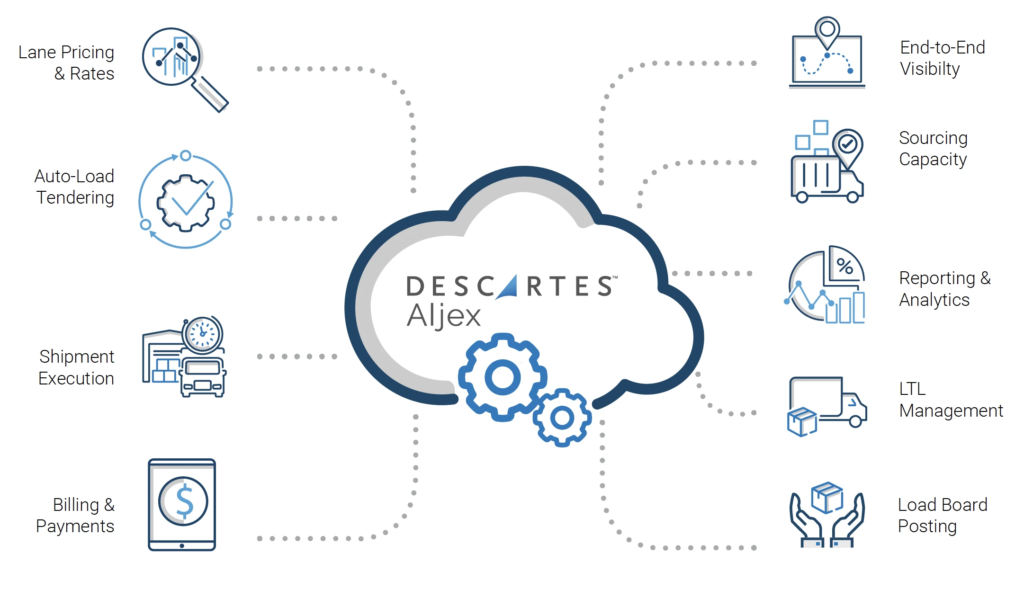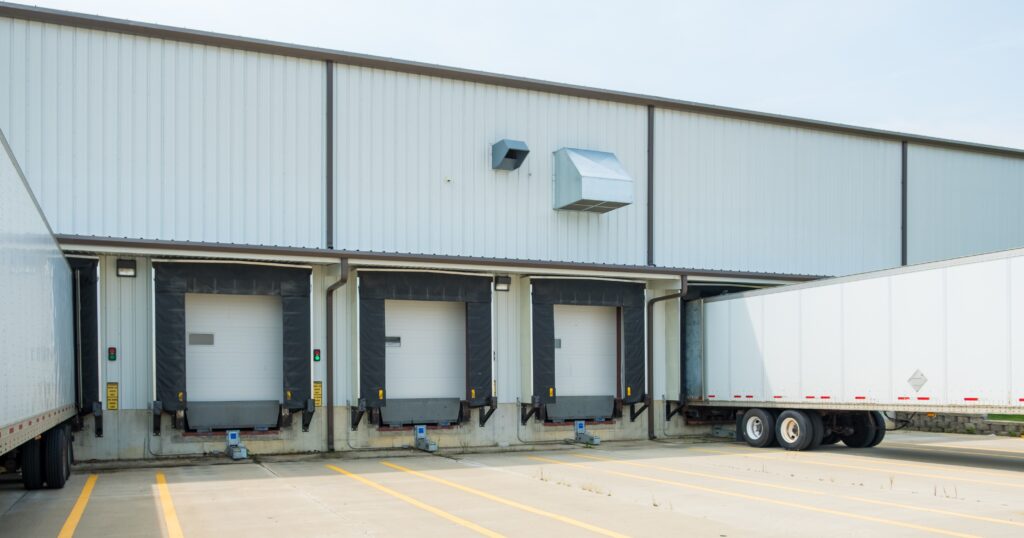Key Takeaways
- TMS Purpose: A Transportation Management System is designed to automate processes, provide visibility into freight, and streamline daily tasks, aiding organizations in operating more efficiently.
- Capabilities: TMS software’s main features include order management, carrier selection, shipment tracking, freight payment & auditing, and reporting & analytics, making it crucial for supply chain management.
- Benefits: Implementing a TMS can lead to significant growth in revenue, improved efficiency, and cost savings, as demonstrated by the case study where the use of a TMS contributed to a 292% increase in growth for SEL Supply Chain Solutions.
What is a TMS software and it’s purpose?
A transportation management system (TMS) is a solution designed to help manage organizations and business more efficiently.
It provides tools that help streamline daily tasks, provide full visibility into freight and automate virtually every step of load tendering.

Different types of TMS
There are currently 3 kinds of TMS software available to match the three different organizational types in the transportation management industry
- Shipper TMS – Streamline and automate transportation, ERP and warehouse processes related to the execution of shipments. Receive valuable analytics and insights to save time and reduce spend on transportation.
- Broker TMS – Helps freight brokers and 3PL’s source capacity, book loads, manage carriers, automate invoicing, and visualize reporting to improve service levels and reduce costs
- Carrier TMS – Streamlines operations while helping carriers find loads for them to fulfill
Each TMS is designed exclusively for the organization type at play, each having their own unique set of capabilities and features, but the general goal is the same – to automate processes and help organizations run more efficiently.
What Are Common Features of TMS Software?
The true nature and goal of TMS software to automate various transportation management tasks through a variety of features. This helps facilitate the movement of goods from suppliers to customers, making it an essential component of the supply chain.
Here are some of the main features you’ll find among Transportation Management Systems within the industry:
- Order management: TMS software starts by capturing transportation requests from various systems, including orders from customers, inventory levels, and production schedules.
- Carrier selection: TMS software evaluates various carriers based on pre-defined criteria, including service level agreements (SLAs), transit times, and costs. It then selects the best carrier for each shipment based on these criteria.
- Shipment tracking: TMS software provides real-time visibility into the status of shipments, allowing users to track and monitor their progress.
- Freight payment and audit: TMS software streamlines the payment and auditing process for freight bills. It validates invoices, applies correct rates, and reconciles discrepancies, helping companies save time and reduce errors.
- Reporting and analytics: TMS software generates reports and analytics that provide insights into transportation performance, including carrier performance, transit times, and transportation costs.
Overall, TMS software helps companies optimize their transportation operations by providing visibility, automation, and control over the entire process. It streamlines tasks, reduces costs, and improves efficiency, making it an essential tool for supply chain management.
How much does TMS software cost?
TMS software pricing will often be determined by organization size, the number of integrations, number of users,
Pricing will also be determined by the location of TMS.
- On-premise TMS can cost organizations anywhere from $50,000 to $400,000 annually to implement.
- Cloud-based TMS software which are hosted by the TMS brand itself will generally be priced from around $2-$5 per load or have a monthly subscription starting around $500
To learn more about pricing, factors, and cost of TMS software; check out our in-depth article.

How much difference does a TMS make for freight organizations?
Those who’ve never heard of a TMS may not understand the significant difference between organizations who use said software and those who don’t.
Implementing TMS into your organization is like going from a black and white TV to a 1080p flatscreen. The difference is real and felt all throughout the organization, from employees to general operations.
A TMS software can help freight organizations with business value tasks such as:
Carrier selection and management: TMS software can help companies find and select the most suitable carriers for their shipments, based on factors such as cost, service level, and compliance.
Freight payment and auditing: TMS software can help companies manage the payment and auditing of freight bills, ensuring that invoices are accurate and compliant with contract terms.
Shipment visibility and tracking: TMS software can help companies track shipments in real-time, providing visibility into the status of each shipment and allowing for proactive management of exceptions and delays.
Case studies also show that organizations who use a TMS have significant improvements in operational efficiency. Take for example our Bahr Transportation case study. The implementation of Descartes Aljex TMS was able to help reduce time spent tracking loads by 30%-40%.
How is this possible?
By utilizing a TMS, Bahr transportation was able to streamline workflows and improve shipment tracking for faster, more cost-effective load booking
What are the best ranked TMS software’s available?
According to G2, the top 10 highest rated TMS brands available on the market are for Winter 2022:
- Descartes Aljex
- 100% of customers among Descartes Aljex have claimed they are easy to do business with
- The platform hosts a sizable network of brokers, 3PLs, shippers, and intermodal users who automatically orchestrate millions of freight shipments every year
- GoComet
- Primarily used for end-to-end logistics profitability, GoComet covers from warehouse to to doorstep
- Trusted by 200+ global brands across 35 countries
- MyCarrierTMS
- Starts out with free pricing with limited capabilities. Pro version starts at $50 per month
- 95% customers report great ease of use and 98% report great support – making it one of the more user-friendly TMS software’s out on the market
- Cargobase
- A full-fledged modular TMS platform that covers all freight modes, Cargobase helps simplify freight for all
- 95% of customers report simplicity and ease of use among the platform
- Ramco Logistics
- Reviews rate 100% ease of use and 100% ease of admin among clients
- Enables optimization and maximizes productivity through disruptive tech around mobility, Command Center & in-memory optimization.
- Freightview
- Many LTL brokers report great utilization for Freightview TMS
- Great reviews – of the 90 posted, all are four and five star reviews
- Turvo
- Connecting people and organizations, allowing organizations to digitally transform their workflows with cloud-based software and mobile applications
- 4.5/5 star reviews
- FleetX
- AI driven freight automation platform which helps digitize end to end operations and provide real time actionable insights using IoT and big data analytics
- 44% less expensive than the average Fleet Management product
- FreightPOP
- Single login platform for all transportation management, including inbound and outbound freight management across parcel, LTL, TL, ocean, and international air
- Rated 4th easiest to use among TMS platforms
- Oracle Transportation Management Cloud
- Control and reduce costs, optimize service levels, support sustainability initiative, and create flexible business process automation within their TM networks
- Averaging 4.0/5 star reviews

How does a freight broker TMS help me run my business more efficiently?
The goal of a freight broker TMS is to help streamline day-to-day business operations and automate manual tasks.
For example, managing details of customer accounts by storing all of the customer information in a single online system. It also improves planning and decision making by helping to identify the most efficient transport options based on important business parameters such as cost, lead-time, number of stops and more.
A TMS makes it quick and easy to manage billing and payments electronically, audit freight bills, and pull various reports needed to manage the financial aspects of the business.
The True Power of a TMS Software – Integrations
A TMS can increase it’s capabilities by integrating with other systems through application programming interfaces (APIs) or electronic data interchange (EDI) protocols.
These integrations allow the TMS to connect with other systems, such as carrier tracking systems, warehouse management systems, order management systems, and other logistics platforms, to gather and share information. Depending on an organization or users needs, a TMS can connect to a variety of different integrations.
For example, when a shipment is booked in the TMS, it can automatically pull in relevant information from the order management system, such as the customer’s contact information and delivery address. The TMS can then use this information to generate a carrier selection, booking and dispatch order, and tracking information.
Overall, a TMS’s integration capabilities and additional functionalities can significantly enhance the efficiency and visibility of your transportation operations.
Will a freight broker TMS give me full visibility into shipments?
Yes. A modern freight broker TMS will include embedded visibility solutions that reduce supply chain disruptions by automating communications and providing real-time visibility into shipments across multiple parties and modes of transportation.
It provides real-time views of shipments and access to details like load status, ETA, and last known location.

What are the benefits of utilizing freight broker TMS?
- Automation – TMS’ helps eliminate most manual processes and streamline end-to-end transaction processing and tracking, from quoting to load assignment, management, and tracking, to financials.
- High Quality Data – Top TMS systems help provide new data and information needed to make fast, confident decisions in selecting the best mode and carrier to cover customers’ loads.
- Safety and Security – Security features and permissions contained in a freight broker TMS will control who can view which types of information, such as potentially sensitive or proprietary data.
- Customer Service – TMS reporting and analytics give brokers the ability to see the cause and effect on customers such as on time deliveries and carrier performance.
- Lower Costs – TMS analyzes data such as the numbers and finances of lanes/routes. From there it can source the top routes and carriers based on efficiency and cost.
- Higher Compliance Levels: The transportation world is filled with numerous rules, regulations, and laws that can often be hard to follow. TMS software can help companies comply with these regulatory requirements and industry standards, such as those related to carrier safety, hazardous materials, packaging & handling, and freight payment.
- Better Decision-Making: Thanks to higher quality data and analytics, TMS users can take said data and utilize to make more informed transportation decisions, such as carrier selection, mode selection, and route optimization.
- Boosted Productivity Levels: TMS software can help companies automate manual processes, reducing administrative burden and enabling staff to focus on higher-value activities. TMS platforms have been shown to increase time savings by up to 25% for a brokerage and it’s staff.
- Superior Relationships: With automated workflows and an increase in data sharing, transportation management systems enable better collaboration between carriers, shippers, and other supply chain partners, allowing them to communicate and work better together.
- Greater Visibility Levels: TMS software provides real-time visibility into transportation operations, including shipment tracking, carrier performance, and logistics costs. This visibility helps organizations to make more informed decisions and optimize their transportation operations.

How will a freight broker TMS add value to my business?
A well-designed TMS will let you quickly access and compare current and historical pricing information to help make the most informed choices to get the best possible lane pricing.
It will also provide a number of management reporting and analytics tools to help you measure performance to make better informed strategic decisions.
Document storage and retrieval options provided by a freight broker TMS will help reduce paper clutter and increase productivity by simplifying document imaging, management and distribution of vital documents.
By giving real-time views into shipments and supplying status details for each load, a TMS helps the team react quickly to possible delays to improve customer satisfaction and increase on-time performance.
How will a TMS help with dispatch?
A transportation management system (TMS) should offer map-based dispatch, which provides an intuitive graphic view that’s easy for the organization to scan and monitor loads.
What Is the Future of Transportation Management Systems?
The future of Transportation Management Systems and related software are likely to be shaped by several key developments which we may see in the near future.
Advanced Analytics and Artificial Intelligence
With the rise ChatGPT and other highly advanced AI tools, it’s only a matter of time before TMS software incorporates similar technology. Analytics and artificial intelligence will enable more accurate predictions of trends, seasonal shifts, and industry direction. By analyzing vast amounts of freight data from a variety of sources, such as carrier data, weather forecasts, market trends, and historical shipment data, AI tools will be able to identify patterns and trends that can help predict future outcomes with extreme accuracy and confidence.
Increased Focus on Sustainability and Environmental Impact
The transportation industry has a massive impact on environment and climate factors. In recent years; consumers, investors, employees, and other stakeholders are demanding that organizations operate in an ethical and sustainable manner and take responsibility for the impacts on society and the environment. TMS software is likely to incorporate features that enable more efficient and sustainable transportation operations, ultimately reducing risk and mitigating negative impact. This may include routing optimization for reduced emissions, carbon footprint tracking, and carrier performance monitoring based on sustainability criteria.
Blockchain Technology
If you’re not familiar, blockchain technology is a distributed, decentralized database system that allows multiple parties to store and verify data in a secure and transparent way without the need for intermediaries. TMS software can utilize blockchain to enable greater transparency and traceability across the entire supply chain. Such technology will be essential for data security and document management, a key piece of TMS software. This may include features such as secure and immutable data records, smart contracts, and automated payments.


